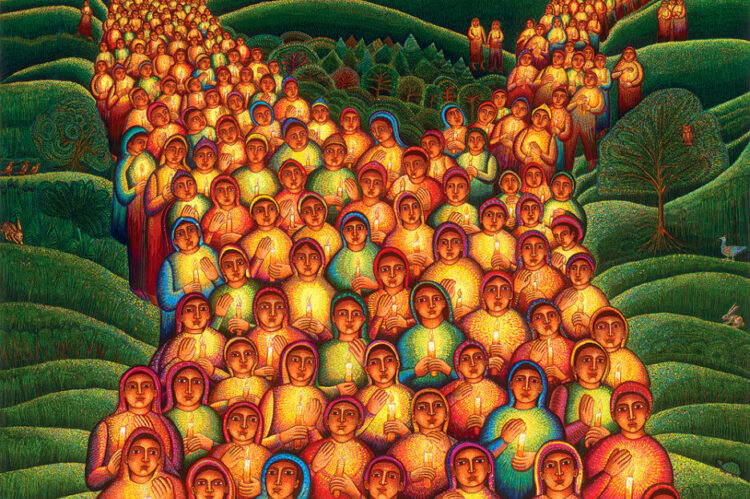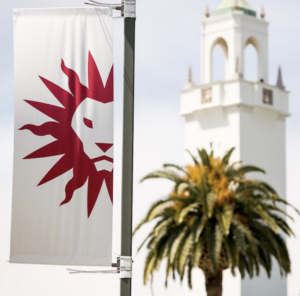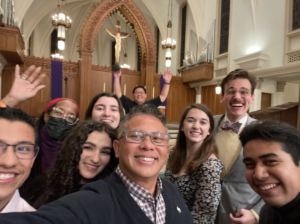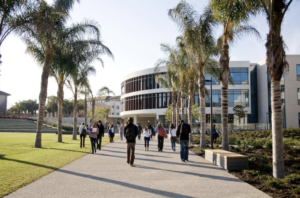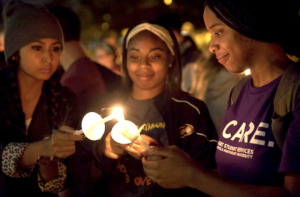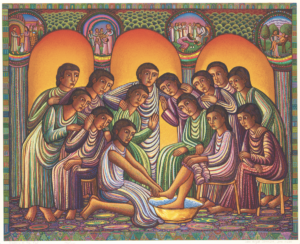Campus ministry ought to create a welcome, safe space for first-year students to begin their college journey, to celebrate their faith and their gifts, and to be and become their authentic selves. At the same time, Christian leaders ought to provide spaces that accompany this journey and offer a home for all, yet inclusive welcome is not always a top priority in church circles.
A Space of Convergence, A Space of Liminality
“I’ve yet to find the appropriate tension / between sword and surrender.”~ Gillian Ebersole, The Water Between Us[1]
These are the first words of a poem by my student, Gillian Ebersole. It is a poem that gives a profound glimpse into the experience of a gender non-binary college student who is also a faithful, practicing Catholic.
Their poem testifies to the ways in which these identities— gender non-binary and Catholic— can coexist in complex and beautiful ways. Their poem is also the title of and inspiration for my project: Between sword and surrender: Finding new narratives for Christian belonging.
Gillian is one of nine students with whom I have had the privilege of ministering on a Catholic university campus in Southern California whom I interviewed for this project, and whose honesty, questions, and challenge form the heart of my reflection.
Together, they have unsettled the comfortable and familiar ways in which I think about and practice liturgical and musical ministry. They have taught me what it means to truly extend welcome and embody radical Christian hospitality.
And they have taught me that discerning the shape of Christian welcome means more than nice words. It demands instead creating a diverse and brave space where students—especially first-year college students—might discover and embrace their faith, gender and queer identities.
They have inspired me to imagine ways of
restoring trust,
rekindling relationships,
and rethinking ritual religious narratives to
rebuild spaces of inclusive ministry.
I have learned that an intersectional space where faith, gender and queer identity converge is a space where God meets the God in us. It is a place of convergence that urges to reflect on how deeply we really know our own selves.
This convergence space is often a liminal one, a place of tension between revolution and redemption, between acceptance and rejection, a space that discerns both certitude and ambiguity. Here we are challenged to consider deconstructing binary markers and subverting hurtful heteronormative narratives that keep us from discovering the intersections of faith, gender and sexual identities. Through this liminality, we learn to work for justice by re-thinking what it might really mean for us to build inclusive community.

Finding New Narratives
My work in liturgical music and worship ministry brings me from Singapore to Los Angeles and on to the campus of Loyola Marymount University (or LMU). As a member of the campus ministry team at LMU, I work with students in a Catholic context shaped by the distinct charisms of our three founding religious orders: the Society of Jesus, the Religious Sisters of the Sacred Heart of Mary (or Marymount Sisters) and the Sisters of St. Joseph of Orange—
that all may be one,
that all may have life,
for the greater glory of God.
Many students are drawn to LMU because of the social justice messages that these three religious orders promote.
Yet these aspirations toward justice are not always fully realized, especially for those who inhabit gender and queer identities. One incident in particular challenged me to think about new ways, new narratives to engage in intentional Christian hospitality: the suicide of an LGBTQ Christian student in my third year of ministry at LMU. This tragic incident brought me face to face with the sense of profound loneliness, abandonment, and even hopelessness that many LGBTQ Christian students feel when the communities they expect to welcome them unconditionally instead greet them with ambivalence or even hostility.
Religious circles ought to heal the broken. In fact, some studies show that religious communities may have the capacity to protect from LGBTQ suicide ideation and completion. Yet, paradoxically, another study shows that one of the top three reasons Americans leave religion is the unwelcome of LGBTQ community members by faith communities.[2] Where in the arc of this narrative do our welcome and belonging narratives exist? Might this post-pandemic liminal space be a place to begin thinking of rebuilding inclusive community?
In LMU campus ministry, campus ministers lay and ordained, practice a simple mission message tied to the charisms of the founding orders. The mission is a simple three-word phrase — belong, believe and become. The heart of my project interrogates how much we as ministers promote/encourage or sometimes fail to promote/encourage this belonging to God and to each other, believing in ourselves and in our dreams and ultimately becoming citizens of this world and the world that is to come.
Can the church be a better safe place?
In campus ministry and its way of being, is there space to live in and to come together as we are?

Listening to Students
Before any change can take place, I think those of us who hold power in ministerial contexts must hold a mirror up to ourselves. The nine interviews have been my mirror moments.
One common thread surfaced during the interviews: a desire for a more livable intersection of faith, gender, sexuality and social justice. And from this thread, two further topics of conversation arose: 1) identifying space to be recognized, understood and not be left as an outsider, and 2) becoming true to the self in caring and knowing authentically “who we are” before taking on tasks of bridge building. During the interviews I have also learned that for all of the students with whom I spoke, belonging and becoming preceded belief. In other words, if people don’t feel that they belong or that it is a space in which they can become fully who they are, any efforts toward building a community of faith is impossible.
Here are a excerpts from three student interviews[3]:
Nick[4] who identifies as gender non-binary and describes himself as a masculine-coded individual, is Atheist and finds belonging as a choir and cantor at Mass. Nick seeks to understand belonging community through the frame of social outreach practice, and questions what it means to belong to a community through relationship building. He has a deep desire for justice.
Nina[5] who is gender non-binary and female presenting finds believing and self-acceptance go hand in hand. They also have a desire for justice and to be a bridge by bringing their own queer identity into faith circles.
Jo[6], a transgender masculine student who identifies as gender non-binary and gay, is driven by change — to change themselves to better understand church teaching as well as to change the church to better understand the LGBTQ community. Jo “wants to be me in this Catholic space.” With gentle disclosure, Jo becomes a bridge from trans to trans-Catholic.
Gillian’s poem with which I began with contains another line that has been formative for this project:
“It is hard for me to trust a religion / that speaks in clichés.”
Our campus ministry LGBTQ group is called “Beati” which means the blessed ones. Inspired by Gillian’s words and the testimonies of all the students, I want to share a set of Beatitudes for Inclusive Ministry I composed that attempt to resist the clichés around welcome and inclusion that too often define our communities.

Beatitudes for Inclusive Ministry
Blessed are you who look twice at the world: This beatitude looks at brokenness through a Eucharistic vision of the shamed, despised and broken body that sees beyond the mere enforcement of rules to knowing that every table story shared is the redemptive gospel of Jesus which desires intimate belonging. It is inspired by Nick who asks the question: “How does God see this person?”
Blessed are you who listen compassionately to the stories of the other: Sharing vulnerabilities with another initiates a trust journey of mutual listening. The true act of listening builds trust. It is a challenge that requires openness and humility to learn from the other, to resist solving things that might appear problematic. This beatitude encourages believing in the unknown, assuming the best of a situation and imagining hopeful healing that follows. It is inspired by Jo who feels awkward in Catholic spaces.
Blessed are you who love first yourself before loving others: This beatitude echoes Mark 12.31 – “love your neighbor as yourself.” It follows Nina’s drive of having “the basic building blocks of ‘who we are’ set up” before being and becoming “people for others,” which spotlights the significance of self-care. Understand and love yourself. And only after that, act in love with God.

Conclusion: Moving to a Liturgy of Welcome
Shaped by these beatitudes, I have scripted an ecumenical evening prayer service as a way of re-thinking how we might welcome the incoming first-year students to the LMU campus during the University’s Welcome Weekend. This is available in the appendix if you’d like to use it or refer to it. I have also included a worship aid or program as well as a recording of Love, Burn Bright, the song that centers the Litany of Belonging.
My hope is that this prayer will provide an alternate narrative for a place of true encounter, a place where we might find God accessible and where we will allow God to meet the God in us.
[1] Gillian Ebersol, “I hope everything I have lost is under a bookshelf in the corner of heaven,” in The Water Between Us (Sequim: Headmistress Press, 2021), 2.
[2] Robert P. Jones, Daniel Cox, Betsy Cooper and Rachel Lienesch, Exodus: Why Americans are Leaving Religion – and Why They’re Unlikely to Come Back (Washington, D.C: PRRI, Released September 22, 2016), 1-7.
[3] For this study, I have changed the names of the students interviewed to protect their anonymity
[4] Excerpts from an interview with Nick on November 24, 2019.
[5] Excerpts from an interview with Nina on January 21, 2022.
[6] Excerpts from an interview with Jo on March 26, 2021.

 Appendix I: I Hope Everything I Have Lost, by Gillian Ebersole
Appendix I: I Hope Everything I Have Lost, by Gillian Ebersole
I hope everything I have lost is under a bookshelf
in the corner of heaven
Nothing is more practical than finding God, that is, than falling in love in a
quite absolute, final way.
~ Pedro Arrupe
I’ve yet to find the appropriate tension
between sword and surrender.
Once when we were arguing
about religion, you asked me –
do you even love God?
A professor I loved died
after consoling me with an email,
a gentle elbow, and a nudged chair.
It is hard for me to trust a religion
that speaks in clichés.
My mother is teaching the alphabet
to a small boy in a spare bedroom.
Every few minutes he sings a song
he made up just for her.
I am obsessed with disproving
the existence of a good God,
which means I wear my problems
as emblems, add world tragedies
to a jean jacket overflowing
with iron-on cynicism, keep
a running list of evil people
who do not deserve grace.
I win a gift card and buy candles,
try to burn sacred into my room.
I’m desperate for the smell of funerals
and incense and Sunday mornings.
What is on the other side of metal and a white flag?
If you asked, I’d lay down my sword
at your altar, spend my life kneeling
until I believed love could heal the bruises.

Appendix II: A Liturgy of Welcome
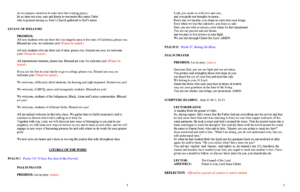
Click here to download a script for this liturgy
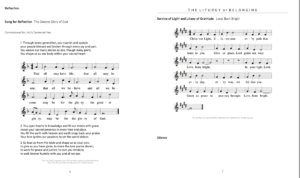
Click here to download a copy of the worship aid/program for this liturgy
